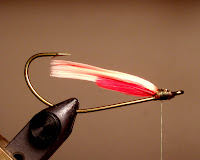 In conventional bass angling the weedless-rigged rubber worm is such a mainstay because it is simple and easy to rig, appears natural and unhindered in the water and—most importantly—seldom fouls or snags. A fly equivalent to this lure is not commercially available.
In conventional bass angling the weedless-rigged rubber worm is such a mainstay because it is simple and easy to rig, appears natural and unhindered in the water and—most importantly—seldom fouls or snags. A fly equivalent to this lure is not commercially available. Whereas many hard-core conventional bass fishermen tend to fish larger bodies of water, the vast majority of the weekend worrier warm-water fly fishermen across the country spend their Saturdays not astride a Hunter bass boat on a large reservoir…but behind a neighbors’ barn harassing the farm-pond bass. The major handicap these fledgling fly casters have burdened themselves with (and what will, in the end, keep them forever loyal and tethered to the spinning rod) is a severe lack of proper fly-replacements for their go-to conventional lures and rubber baits.
The Texas Ringworm is a simple fly to rig and fish when compared to its rubber-worm contemporaries. The hard-mono loop keeps the large TMC 8089 hook facing up and snag free. It stays in place even through the longest or brutal casting, but detaches immediately once a bass eats and the hook is set. Once the fish has been detached, the hard-mono loop is easily re-attached.
Texas Ringworm Recipe (Or buy online for $5.99 each)
Black Eel
Tail
Hook: TMC 105 #4
Thread 1: Daville’s 3/0 waxed monocord—dark brown (used as main dubbing loop)
Thread 2: Uni-Thread 6/0 black (used as small finishing dubbing loop)
Tip: Fluorescent Green Chartreuse McFlyfoam
Dubbing 1: Poul Jorgensen SLF Salmon & Steelhead dubbing “claret black”
Dubbing 2: Poul Jorgensen SLF Salmon & Steelhead dubbing “peacock”
Gangion: Hard Mono or Fluoro (.017) and Hareline Dubbin standard tubing “brown”
Hook: TMC 105 #4
Thread 1: Daville’s 3/0 waxed monocord—dark brown (used as main dubbing loop)
Thread 2: Uni-Thread 6/0 black (used as small finishing dubbing loop)
Tip: Fluorescent Green Chartreuse McFlyfoam
Dubbing 1: Poul Jorgensen SLF Salmon & Steelhead dubbing “claret black”
Dubbing 2: Poul Jorgensen SLF Salmon & Steelhead dubbing “peacock”
Gangion: Hard Mono or Fluoro (.017) and Hareline Dubbin standard tubing “brown”
Body
Hook: TMC 8089 #2
Thread: Uni-Thread 6/0 olive
Throat 1: Fluorescent red marabou
Throat 2: Golden olive marabou
Main Body: Magnum rabbit strip “black”
Topping: 3 feathers Hareline Dubbin “Grizzly Marabou Olive” (GRIZM263)
Head
Core: Loon UV fly paint “yellow”
Eyes: Hareline Dubbin 3/16” Oval Pupil 3D Eyes Red/Black Pupil (OP3310)
Bottom: Loon UV fly paint “red”
Top: Loon UV Knot Sense
Outer Coating: Loon UV Knot Sense, then final coat of Hard-as-Hull
Sunfish
Tail
Hook: TMC 105 #4
Thread 1: Daville’s 3/0 waxed monocord—white (used as main dubbing loop)
Thread 2: Uni-Thread 6/0 olive (used as small finishing dubbing loop)
Tip: Montana Fly Frog’s Hair golden yellow
Dubbing 1: Dave Whitlock SLF dubbing “minnow belly”
Dubbing 2: Dave Whitlock SLF dubbing “dragonfly nymph olive”
Gangion: Hard Mono or Fluoro (.017) and Hareline Dubbin standard tubing “light olive”
Body
Hook: TMC 8089 #2
Thread: Uni-Thread 6/0 olive
Throat 1: Fluorescent red marabou
Throat 2: Shell pink marabou
Main Body: Olive Barred Magnum rabbit strip “light olive” (Hareline BMR212)
Topping: 3 feathers Hareline Dubbin “Grizzly Marabou Olive” (GRIZM263)
Head
Core: Loon UV fly paint “yellow”
Eyes: Hareline Dubbin 3/16” Oval Pupil 3D Eyes Orange/Black Pupil (OP3271)
Bottom: Loon UV fly paint “red”
Top: Loon UV Knot Sense
Outer Coating: Loon UV Knot Sense, then final coat of Hard-as-Hull
Tying step 1 Create 8 inch dubbing loop using 3 strands of 3/0 waxed monocord. Dubbing 1: Dave Whitlock SLF dubbing “minnow belly”, Tip: Montana Fly Frog’s Hair golden yellow, Dubbing 2: Dave Whitlock SLF dubbing “dragonfly nymph olive”. Twist and create Geezus Lizard tail by allowing twisted dubbing loop to furrel back over itself.
See More on this Method!
Tying step 2 Mount tail onto TMC 105 size 4 hook using Zap-a-Gap to reinforce hold to the hook shank. Then create small three-tone dubbing loop to cover junction and continue tail variegation
Tying step 3 Apply very small amount of Zap-a-Gap to junction of tail tip
Tying step 4 Trim and taper tail tip, also brush out entire tail using dubbing brush. The finished tail should be 2 ½ inches long. Cut the hook point off with heavy wire cutters.
Tying step 5 Cut a 6 inch piece of .017 hard mono or Rio Fluoroflex tippet, loop through eye and slide on a quarter inch of Hairline Standard Tubing
Tying step 6 On a TMC 8089 #2 tie in two throat tuffs of marabou using olive thread
Tying step 7 Double-thread the mono into the magnum rabbit strip
Tying step 8 Slip mono loop over hook point and over the bend
Tying step 9 Thread mono into hook eye and then tie down and adjust length of mono so hinge works correctly. There should be a slight “click” when the loop is properly engaged
Tying step 10 Once mono is adjusted correctly, finish tying it down and trim off tags on the underside. Apply some Zap-a-Gap to insure that it is secure and will not move or slip
Tying step 11 Bring the rabbit strip over and tie down at head of fly
Tying step 12 Tie in 2 or 3 pieces of olive grizzly marabou on top of the rabbit strip
Tying step 13 Trim marabou and whip finish...once tall, but narrow head has been built
Tying step 14 Coat head with yellow UV fly paint. It will appear green when applied over the green thread
Tying step 15 Stick on eyes
Tying step 16 Flip upside down and apply red UV fly paint



















No comments:
Post a Comment
Note: Only a member of this blog may post a comment.